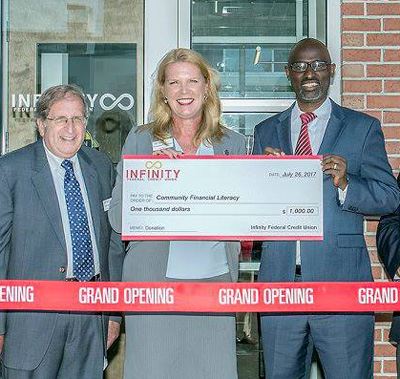When the first credit union in Maine was formed in 1921, it marked the beginning of the CU System in the state and laid the foundation for what, nearly a century later, has become one of the nation's strongest credit union systems. In the ensuing years, many more credit unions would be chartered in Maine for a variety of reasons. In communities, such as Lewiston/Auburn, Augusta/Waterville, and Biddeford/Saco, one of the primary reasons for the rise of credit unions centered around immigrants who were denied financial services from 'traditional banking institutions'. In this case, many were Franco-Americans from Quebec who didn't speak the language and had nowhere else to go. Thanks to the cooperative spirit, they were able to join a credit union and get access to financial services.

(Gene Ardito, President/CEO of cPort CU, talks about some of the outreach that his CU and a number of Maine CUs are doing to help new Mainers during an interview that aired statewide on Newscenter.)
Today, some parts of Maine are experiencing an influx of a new generation of immigrant from countries, such as Somalia, Rwanda, Burudni, Syria, Iraq, and the Congo. Once again, Maine credit unions are providing a source of financial services for many immigrants. At cPort CU, the credit union has been active in the immigrant community for a number of years, including developing a scholarship program that began in an elementary school in Portland, which had a large immigrant population. The program was aimed at getting kids interested in college, and provide a scholarship to help them get started. Additiionally, Gene Ardito, President/CEO of the credit union, served on the Board of Community Financial Literacy, including several years as Chair, an organization that is focused on helping immigrants learn about the basics of financial literacy. "Several years ago, we recognized the importance of reaching out to immigrants and welcoming them as members. Today, the credit union employs several immigrants who speak multiple languages to help make the experience easier, and offer specific products, such as microfinance loans, and by listening to the needs of the immigrant community was the first financial institution in Maine to offer citizenship loans for immigrants," added Ardito.
Ironically, the first CU in Maine, Telephone Workers of Maine CU (now Infinity FCU) is also actively involved in reaching out to the immigrant community. When the CU opened a new branch in Portland's back cove area last summer, it announced a new 'Bridge to Citizenship' loan program. "At Infinity Federal Credit Union, we celebrate diversity of experience, perspective and ideas in the work we do and the people we serve," Liz Hayes, President/CEO of the CU, said. Hayes noted that Infinity FCU has team members who speak many of the languages of Maine's immigrant population, including Portuguese, Spanish, Turkish, Azeri, French, Kirundi, Kinyarwanda, Russian, Vietnamese, Nepalese, Hindi, Punjabi, and Bengali. The credit union, in partnership with Portland Adult Education, has also hired new employees who speak multiple languages.
 When Infinity FCU opened its new branch on Baxter Boulevard, it focused on its commitment to immigrants, many of whom reside within walking distance of the new branch. At the branch grand opening, the CU announced its new Bridge to Citizenship Loan and made a contribution to Community Financial Literacy. Pictured here are: Sam Novick, Board Chair at Infinity FCU; Elizabeth Hayes, President/CEO Infinity FCU; and Claude Rwaganje, Executive Director of Community Financial Literacy.
When Infinity FCU opened its new branch on Baxter Boulevard, it focused on its commitment to immigrants, many of whom reside within walking distance of the new branch. At the branch grand opening, the CU announced its new Bridge to Citizenship Loan and made a contribution to Community Financial Literacy. Pictured here are: Sam Novick, Board Chair at Infinity FCU; Elizabeth Hayes, President/CEO Infinity FCU; and Claude Rwaganje, Executive Director of Community Financial Literacy.
In a segment that aired recently on WCSH 6 and WLBZ 2 that the Maine CU League coordinated to highlight the work of credit unions with the immigrant community, Ardito, whose mother emigrated from Italy in the 1930s, talked about the challenges that many immigrants face when coming to Maine. "Language is certainly an obstacle, as is a lack of trust and understanding of financial services. Credit unions and non-profits are leading the way to help immigrants coming to Maine with services and resources to help them become financially solvent."
Both Ardito and Hayes said it's great to see credit unions "leading the way in helping immigrants by being proactive in providing services, resources and support. It certainly captures the credit union philosophy of 'people helping people'."
